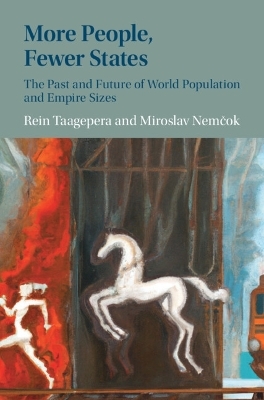
More People, Fewer States
Cambridge University Press (Verlag)
978-1-009-42782-1 (ISBN)
The long-term development of political systems over extended time periods has been somewhat neglected. More People, Fewer States examines world history through population explosion and empire size changes across 5000 years of socio-technological development, revealing three distinct phases: Runner, Rider, and Engineer empires. A careful comparative approach reveals that Old Egypt, Achaemenid, Caliphate, Mongol, and Britain each achieved remarkable yet rarely acknowledged expansions, leading to their successive record empire sizes. If identified past trends persist, a potential single world state could emerge by 4600, although environmental concerns may intervene. Focusing on population dynamics and area metrics of states, this book provides a novel framework for evaluating the growth, structure, and decline of empires. It not only illuminates ancient historical space but also ventures into future projections, making it an essential read for scholars interested in the long-term evolution of political systems.
Rein Taagepera, Ph.D. in physics, received in 2008 the Johan Skytte Prize, the largest in political science worldwide. His books include Predicting Party Sizes (2007), Making Social Sciences More Scientific (2008), and (with Matthew Shugart) Votes from Seats: Logical Models of Electoral Systems (2017). Miroslav Nemčok is a Postdoctoral Fellow at the Department of Political Science, University of Oslo. His research addresses a variety of topics – ranging from comparative political institutions and party politics to the people's experiences with political systems – which all tackle the question: why people support democratic systems?
1. More People and yet Fewer States; 2. Two Phases in World Population Growth: A Novel Visualization and a Logical Model; 3. Did Written Records Give a New Boost to Population Growth? 4. From Populations to Empires and The Role of Technology; 5. Empires: Definitions, Measurements, and Growth-Decline Curves; 6. Talkers, Doers, Regulators, and Followers: A Conceptual Framework for States; 7. From Pecking Order to Political Order; 8. Runner Empires (-3000 to -600); 9. Early Rider Empires (-600 to +600); 10. An Apparent Dead-End: Republics; 11. Stirrup Empires (600 to 1200); 12. The Last Rider Empires (1200 to 1800); 13. Engineer Empires (from 1800 on); 14. How Top States Have Become Larger; 15. How the Number of States Has Decreased – and What's Ahead; 16. Population Density, and Connecting World and Top State Populations; 17. Growth-Decline Patterns and Durations of Empires; 18. Empire Shapes, Languages, and Reigns; 19. Cities and Empires; 20. How History Fades – and Expands; 21. The Future of the Super-Cancer of the of Biosphere.
| Erscheinungsdatum | 10.08.2024 |
|---|---|
| Zusatzinfo | Worked examples or Exercises |
| Verlagsort | Cambridge |
| Sprache | englisch |
| Gewicht | 647 g |
| Themenwelt | Geisteswissenschaften ► Geschichte ► Allgemeine Geschichte |
| Geisteswissenschaften ► Geschichte ► Teilgebiete der Geschichte | |
| Sozialwissenschaften ► Politik / Verwaltung ► Europäische / Internationale Politik | |
| ISBN-10 | 1-009-42782-2 / 1009427822 |
| ISBN-13 | 978-1-009-42782-1 / 9781009427821 |
| Zustand | Neuware |
| Haben Sie eine Frage zum Produkt? |
aus dem Bereich


